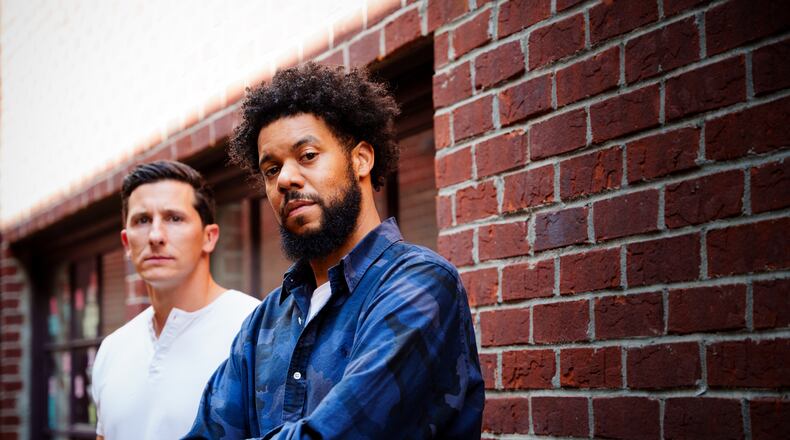The phrase “war on drugs” was invented by Richard Nixon in 1971 and has retained its power for five decades. But if this is a war, is there an actual winner or just a whole lot of losers?
That’s the premise behind a new podcast “The War on Drugs” that features Atlanta comic and actor Clayton English and attorney Greg Glod.
Over ten episodes, the podcast explores the fallacies and misconceptions stemming from a bruising battle that has often penalized victims as much if not more than the protagonists. The result: broken families and millions in prison.
The pairing of English and Glod is not an obvious one.
Glod, a fellow at Americans for Prosperity Senior Criminal Justice and advisor to Stand Together on Criminal Justice and Drug Reform, first hooked up with podcast company Lava for Good to do this podcast. They needed a co-host and approached English, a “Last Comic Standing” winner who has addressed the war on drugs in his comedy.
“I’m a policy nerd,” said Glod, who is based in Washington, D.C. “We needed someone with a lived experience. Clayton’s act was hilarious and thought provoking. He grew up in the inner city and his interactions with the police were different from mine. My dad was a cop. I grew up in a white suburb. But we get along and understand the issues coming from different sides. We make each other laugh.”
In each of the 10 episodes, the pair interviews experts and historians. English is like a surrogate for the listener, asking questions from a layman’s viewpoint, while Glod provides an insider’s view on how criminal justice and drugs are intertwined.
“This isn’t a war on drugs,” English said. “This is a war on people ... I’ve been pulled over and harassed by the police. I smoke weed. I’m ducking and dodging every day. This podcast makes sense. I just love learning stuff. I would probably seek out this information anyway in a documentary or a podcast I wasn’t a part of.”
The opening episode shows the war on drugs precedes the name itself, outlining how Harry Aslinger, the first commissioner of the U.S. Treasury Department’s Federal Bureau of Narcotics, fueled the false narrative of “reefer madness.” Aslinger focused his animus on racial and immigrant groups, specifically targeting jazz musicians like Billie Holiday.
“He weaponized this woman’s addiction,” English said. “Just demonized her for the drug thing all because she was a little powerful.”
Over the years, “if you have a minority group you want to oppress or suppress,” English added, “assign a drug to them. Look at crack cocaine in the 1980s.”
There is a discussion of mandatory minimum sentences, which ended up incarcerating millions who may have only carried a minor amount of drugs. There is another podcast episode focused on how hundreds of thousands of Americans are still in prison for pot possession when so many states have fully legalized marijuana.
They interviewed a man who has been in prison nearly a quarter century despite the fact he didn’t technically have any drugs on him when the cops arrested him but was imprisoned based on testimony of a criminal trying to reduce his own time in prison.
“It’s crazy people are currently incarcerated for things that others are making millions in profits off of,” Glod said.
“This man was only harming himself with his prior drug use,” English said.
One episode has a specific Atlanta focus: a talk with comic Eric André, who was stopped in 2021 by Clayton County police before boarding an airplane at Hartsfield-Jackson International Airport as they were seeking illegal contraband in what is dubbed “civil asset forfeiture,” which gives police wide berth to seize any property allegedly connected to a crime.
When English heard about André’s incident, he reached out to his friend to tell him of a similar experience he had a few months earlier.
The two last year sued Clayton County and its police department for this “jet bridge interdiction program,” claiming racial profiling, which Clayton County has denied.
Glod hopes if the podcast does well, they have plenty of ideas for a second season. “We want to explore solutions and what’s happening now in places like Switzerland and in Oregon, where there is a drug decriminalization experiment going on,” he said.
Sadly, he said, there are few signs this “war on drugs” is ending any time soon.
“It’s too big to fail at this point,” Glod said. “There is too much money and manpower wrapped up in the drug war. There’s a bill in Arizona trying to give the death penalty for those who provide fentanyl to someone else. It’s the same [expletive] stuff that has not worked in the past.”
He noted that fentanyl is the hottest drug and illegal pills are flowing in from Mexico and China. At the same time, politicians still feel pressure to be “tough on crime,” even if it means punishing addicts.
“I want to get the dialogue going,” English said. “People need to call their congressmen, their governor if things aren’t working. If enough people get upset, things can get done.”
IF YOU LISTEN
“The War on Drugs,” on various podcast platforms including Apple, Google and Spotify
About the Author
Keep Reading
The Latest
Featured


